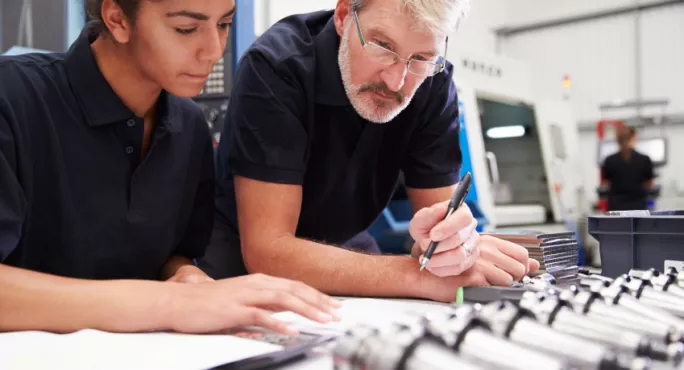The apprenticeship programme risks increasing gender bias in engineering, where fewer than one in 10 of the workforce are female, according to a new report released today by the Learning and Work Institute.
Apprenticeships are vital to address vital skills needs and facilitate social mobility. Yet while just over half (52.5 per cent) of those on apprenticeships are women, only a fraction are Engineering and Manufacturing Technologies (EMT) apprentices, according to the report.
The findings are from an analysis of data from the government’s Find an Apprenticeship website. This found that women accounted for just 6.7 cent of successful applicants for EMT apprenticeships in 2015 and early 2016.
Women are much less likely to apply for these types of apprenticeships, with just 3.7 per cent of female applicants choosing to go for EMT apprenticeships compared with 34.6 per cent of male applicants.
Greater efforts need to be made to encourage women and into engineering apprenticeships, says the report, released to mark International Women’s Day.
It warns: “Women are under-represented in many Stem (science, technology, engineering and maths) areas, but within the engineering sector the gender imbalance is particularly stark.” The lack of females in the sector is “contributing to wider gender pay inequalities and posing significant challenges to the supply of skills into the economy”.
Existing inequality could worsen
The report says that unless “significant gender segregation” is tackled “we face a significant risk that rather than widening opportunities for women and girls, the apprenticeship programme could instead further exacerbate the gender bias within the sector”.
It recommends that more is done to persuade women and girls to apply for EMT apprenticeships and that female applicants are supported in completing their apprenticeships.
“Unless the imbalance in apprenticeships is addressed,” there is a danger that the apprenticeship programme will worsen the gender bias in engineering and technology, “rather than providing opportunity for women and men alike,” according to Dr Fiona Aldridge, assistant director, research and development, Learning and Work Institute.
Jenni French, Programme Manager at the Gatsby Charitable Foundation, which commissioned the report, said the under-representation of women in many Stem jobs “is particularly stark in engineering apprenticeships”.
She added: “Not only does this lead to inequalities in pay but this gender imbalance has significant implications for the supply of skills into the economy”.
Apprenticeships and skills minister Anne Milton said: “International Women’s Day is a brilliant time to talk about why more women are choosing an apprenticeship and in subjects that used to be seen as for men. I want lots more women seeing apprenticeships in science, technology, engineering and maths as a real and achievable choice. Our Year of Engineering campaign is highlighting the amazing opportunities these fascinating subjects can give, so my message is sign up today!”
Want to keep up with the latest education news and opinion? Follow Tes FE News on Twitter, like us on Facebook and follow us on LinkedIn




